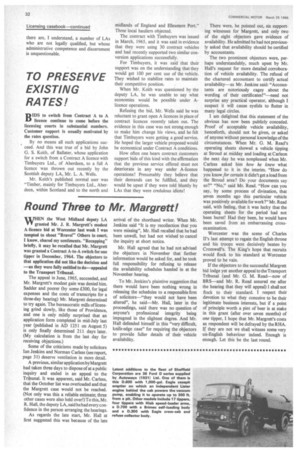TO PRESERVE EXISTING RATES!
Page 34

If you've noticed an error in this article please click here to report it so we can fix it.
BIDS to switch from Contract A to A licence continue to come before the licensing courts in substantial numbers. Customer support is usually motivated by the rates question.
By no means all such applications succeed. And this was true of a bid by John G. S. Keith, of Ballater, whose application for a switch from a Contract A licence with Timbuyers Ltd., of Aberdeen, to a full A licence was thrown out recently by the Scottish deputy LA, Mr. L. A. Wells.
Mr. Keith's published normal user was "Timber, mainly for Timbuyers Ltd., Aberdeen, within Scotland and to the north and midlands of England and Ellesmere Port." Three local hauliers objected.
The contract with Timbuyers was issued in March, 1965, and it was said in evidence that they were using 30 contract vehicles and had recently supported two similar conversion applications successfully.
For Timbuyers, it was said that their support was on the understanding that they would get 100 per cent use of the vehicle. They wished to stabilize rates to maintain their competitive position.
When Mr. Keith was questioned by the deputy LA, he was unable to say what economies would be possible under Alicence operations.
Refusing the bid, Mr. Wells said he was reluctant to grant open A licences in place of contract licences recently taken out. The evidence in this case was not strong enough to make him change his views, and he felt that Timbuyers were getting a good service. He hoped the larger vehicle proposed would be economical under Contract A conditions.
How often one hears contract customers support bids of this kind with the affirmation that the previous service offered must not deteriorate in any way under A-licence operations! Presumably they believe that their demands can be fulfilled, and they would be upset if they were told bluntly by LAs that they were credulous idiots! There were, he pointed out, six supporting witnesses for Margrett, and only two of the eight objectors gave evidence of availability. He admitted he had not previously asked that availability should be certified by accountants.
The two prominent objectors were, perhaps understandably, much upset by Mr. Hall's request for more detailed corroboration of vehicle availability. The refusal of the chartered accountant to certify actual availability—as Mr. Jenkins said: "Accountants are notoriously cagey about the wording of their certificates!"—need not surprise any practical operator, although I suspect it will cause eyelids to flutter in many legal circles.
I am delighted that this statement of the obvious has now been publicly conceded. Proof of acceptable vehicle availability, henceforth, should not be given, or asked of anyone without personal knowledge of the circumstances. When Mr. G. M. Read's operating sheets showed a vehicle tipping at Stroud at midday and loading at Carleon the next day he was nonplussed when Mr. Carless asked him how he knew what happened to it in the interim. "How do you know for certain it didn't get a load from the Stroud area? Do your documents say so?" "No," said Mr. Read. "How can you say, by some process of divination, that seven months ago this particular vehicle was positively available for work?" Mr. Read said, with feeling, that it was lucky that the operating sheets for the period had not been burnt! Had they been, he would have been saved from an embarrassing crossexamination.
Worcester was the scene of Charles II's last attempt to regain the English throne and his troops were decisively beaten by Cromwell's. The King's hope that recruits would flock to his standard at Worcester proved to be vain.
If the objectors to the successful Margrett bid lodge yet another appeal to the Transport Tribunal (and Mr. G. M. Read—now of BRS—and Mr. R. Read assured me after the hearing that they will appeal) I shall not flock to their standard. I respect their devotion to what they conceive to be their legitimate business interests, but if a point of principle worth a pint of beer is at stake in this grant (after over seven months) of one tipper, I hope that Mr. Margrett's costs as respondent will be defrayed by the RHA. If they are not we shall witness some very un-English behaviour indeed. Enough is enough. Let this be the last round.




















































































































